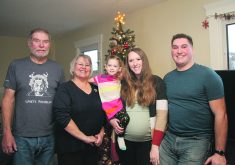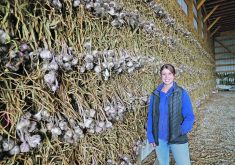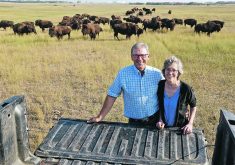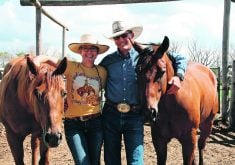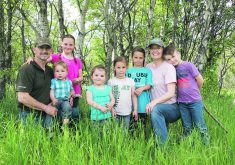WATERTON, Alta. — What will we do with the ranch when Dad dies?
More than one family has asked that question over the years, but few likely discuss it regularly with the dad and mom in question and make plans for that eventuality.
The Garners are not a typical family. They combine their love of their southern Alberta property with a business sense that they believe will ensure Rocking Heart Ranch flourishes well into the future.
The dad, James Garner, a former Saskatchewan MLA and current Alberta horse rancher, has had a quadruple bypass in the recent past, and has few illusions about the need for a succession plan.
Read Also

Fuel rebate rule change will affect taxes and AgriStability
The federal government recently announced updates to the fuel rebates that farmers have been receiving since 2019-20.
In fact, he says he owes it to his own father and grandfather, who homesteaded in Saskatchewan and laid the family’s economic foundation.
His son Marc and daughter Melody are gradually taking over the reins from Jim and their mother, Angel.
“We’ve always had family meetings where each one of us has a vote, and Dad, as the patriarch, has always had veto, but I don’t think he’s ever used it,” says Melody.
Marc also believes in the value of a succession plan that will protect the operation for future generations.
“When I look at the successful ranches … that are, like us, with four and five generations, what’s made them successful is that they’ve had a master plan, a vision.”
Both Melody and Marc have full-time jobs in Lethbridge, she as general manager for a home building company and he as an instructor at Lethbridge College.
And both spend as much time as possible on the ranch where Jim and Angel live full time.
The family maintains a herd of 15 to 20 purebred foundation Quarter horses, which they train and sell. In years past, they’ve raised Black Angus and Texas Longhorn cattle but now horses are the focus and are more manageable for the people and time available, says Marc.
“We’ve spent a lot of money on horses but you get what you pay for when it comes to horses. That is the truth,” he says.
“The horses are just lower maintenance and we focus on quality, not quantity. There’s an old saying that you’re better to put more time on less horses than less time on more horses.”
The goal is to produce versatile, dependable animals that have multiple uses, from trail riding to showing.
Traits evident in their herd today were also evident in their grandfather’s horses used in Saskatchewan in the early 1920s, Marc adds. Those horses took the kids to school and could also pull a plow.
“The things we have changed, our horses aren’t as coarse looking … but the overall characteristics and traits we’re looking for, that hasn’t changed in 108 years.
“Foundation Quarter horses have the old, old genetics from way back in the 1930s that worked for all of those people. That’s the kind of horses we have.”
Marc and Melody both remember visiting Alberta in the 1980s in search of a suitable ranch. Jim and Angel had decided to move the family from Wilkie, Sask., to southern Alberta.
“He’d always had the dream since he was a young boy to move to Alberta,” Melody says about her father. “Something about the wild west, I guess.”
Marc recalls seeing the place for the first time and instantly falling in love with its mountain views, rolling foothills, winding Waterton River and fresh flowing springs.
“Dad said we needed three things: water, that was number one, a view, and trees. Well, take a look around.”
Operating costs and attention to the bottom line have always been part of the family culture, Marc adds. The operation includes a gravel business, construction arm and an acreage subdivision. Angel also operated a gift shop catering to tourists visiting the national park, but that has now closed.
The additional ventures subsidize the horse operation, which Marc admits is a break-even proposition at this stage.
“If you look at it from a business (perspective), you might want to cry. That’s not why we’re here. This is a great way of life. We do the horse thing, the whole family’s involved, it’s fun. Our kids get to enjoy the outdoors.”
Marc recounted a recent trail ride that took him across the British Columbia border in forest wilderness.
“You’re thinking, does life get any better than this? There is no price on that.”
Adds Melody: “We’ve always said the ranch is the healing place. Whenever any of us have had troubles in life, like anybody does, this is the place you come to heal.
“We’re a tight knit family and the ranch has given us that.”
For his part, Jim said he’s happy to see his children take over. He wants the land and water to be protected in the future.
The 500-acre owned and leased property is bordered by the park and otherwise surrounded by land owned by the Nature Conservancy of Canada.
Jim admits some of his ventures have been controversial. The gravel pit and the subdivision have both raised local ire in the past but he maintains that profit “shouldn’t be a dirty word.
“We’re about a family. We’re about diversifying. I don’t see anything wrong with that.”





